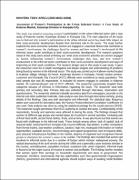| dc.description.abstract | KINYERA TONY APECU (2005-M033-10009)
Assessment of Women’s Participation in the Urban Informal Sector: A Case Study of Kalerwe Market, Kawempe Division in Kampala City
The study was aimed at assessing women‟s participation in the urban informal sector with a case study of Kalerwe market, Kawempe division in Kampala City. The main objective of the study was to find out why women‟s participation in the urban informal sector has made little impact on their socio-economic development despite their dominant role in the sector. The study further explored the socio-economic activities women are engaged in, examined factors that contribute to women‟s involvement, the challenges faced by women and how women‟s involvement in the informal sector could contribute to their socio-economic development. The research questions raised in this study were aimed at finding out: what socio-economic activities are women engaged in, factors influencing women‟s involvement, challenges they face, and how women‟s involvement in the informal sector contributes to their socio-economic development and ways of improving on their work conditions. The research design used in this study is case study. It gave the researcher room for in-depth investigation and deeper insights and understanding of problems being faced by women in the informal sector. The study was carried out in Kalerwe market located in Kalerwe village, Mulago III Parish, Kawempe division in Kampala. Female market vendors, customers and Kampala City Council (KCC) officials were considered as study population. The total sample size was 80 respondents. It included 40 women engaged in activities in Kalerwe market, 30 customers/buyers and 10 KCC officials. The researcher purposively targeted these categories because of richness in information regarding the study. The researcher used both primary and secondary data. Primary data was collected through interviews, observation and questionnaires. The researcher obtained valuable secondary data from newspapers, journals on the internet and other published materials. Data analysis was done through descriptive writing, giving details of the findings. Data was both descriptive and inferential. For statistical data, frequency tables were used and for descriptive data, the Pearson Product Moment Correlation Coefficient (r) was used. Data analysis was done by using the statistical package for the social sciences (SPSS). The researcher sought permission from KCC authority to conduct the study. Confidentiality of the respondents, honesty and openness were adhered to during the study. The findings showed that women of different age groups and marital status are involved in several activities, including sale of fresh food stuffs, second hand clothes, fruits, and air time. It was also found out that women are faced with challenges in the informal trade. These include among others: lack of capital, lack of required skills, harassment from Kampala City Council Officials, bad debtors, 9 unfair competition from formal traders, bad weather conditions, taxation, high rent, inadequate information on market opportunities, available services, new technology and support programmes, lack of required skills, poor physical infrastructure facilities in the market, absence of organised and recognised interest groups to champion the women‟s cause in the market. The findings also revealed that women get involved in informal sector due to a number of factors which include: widespread poverty, the radical downsizing of the civil service during the 1990s and a generally a poor business climate in the country, unemployment, population increase, sustained rural- urban migration. Informal trade is found to be the major source of income to women and profitable. The findings further revealed that women spend their earnings on household requirements and taxes to government The researcher, therefore, recommends that key stakeholders such Non-governmental Organisations (NGOs), government and international agencies should explore ways of availing credit facilities to women, training them in basic skills in commerce and establishment of service infrastructure in the market.
Keywords: Urban Informal Sector, Women’s Participation, Kalerwe Market | en_US |


